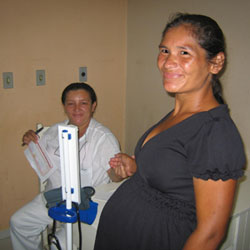CDC's Activities to Improve Treatment of Malaria Illness in Pregnant Women in Latin America
Burden of Malaria in Pregnancy in Latin America Not Known
In Latin America (Central and South America and the Caribbean), an estimated 4% of pregnancies are affected by malaria, which can cause maternal illness and poor birth outcomes, such as low birth weight.

A nurse in the antenatal clinic at Hospital Maternidad de Cruzeiro do Sul, Acre State, Brazil, prepares to take this patient‘s blood pressure.
Courtesy: Julie Gutman, Emory University.
In areas of low malaria transmission, such as Latin America, malaria may cause women to have symptomatic malaria (that is, fever), cerebral malaria, respiratory distress syndrome, premature delivery, or abortion. However, many pregnant women will have infections that are not symptomatic. Asymptomatic infection can cause moderate to severe maternal anemia, which in turn is associated with low birth weight infants and increased rates of miscarriage and stillbirth.
Although malaria in pregnancy can have serious consequences for both the mother and the fetus, very little information is available on the true burden of malaria in pregnancy in Latin America, and even less information is available on the best treatments for malaria in pregnancy.
Best Malaria Treatment for Pregnant Women in Latin America?
Treatment recommendations for pregnant women in Latin American countries have been changing rapidly. In most Latin American countries, mefloquine-artesunate is the first-line treatment for illness caused by P. falciparum. However, there are no data on the efficacy of these drugs for the treatment of malaria in pregnancy. Also, several small studies have suggested that adequate doses for nonpregnant adults may not be adequate for pregnant women.
CDC’s Work
CDC is now collaborating with other partners in the Malaria in Pregnancy Consortium to determine the best malaria treatments for pregnant women. To do this, CDC will be coordinating a clinical trial at sites in South America to assess the safety and efficacy of the currently recommended treatment: mefloquine-artesunate. CDC and its partners will also conduct research to determine the optimal dose for pregnant women. This study will help inform policies on treatment of malaria in pregnant women in Latin America, as well as in other areas with low malaria transmission.
Along with Latin American partners, CDC will also assess how two different malaria parasites, P. falciparum and P. vivax, affect pregnant women in areas with low malaria transmission. To do this, a facility-based cohort observational study will be conducted in pregnant women in three malaria-endemic countries in Latin America: Brazil, Colombia, and Guatemala.
If the incidence and prevalence of malaria infection in Latin America is low, alternatives to intermittent preventive treatment might be more cost effective. One strategy might be active detection of malaria infection, where pregnant women are screened for malaria parasitemia at each antenatal visit with either rapid diagnostic tests or blood smears. Treatment for malaria would then be provided only if the test is positive. These research findings will help inform strategic approaches to control of malaria in pregnancy, as well as document the clinical impact of these infections in the region.
Get email updates about Malaria
To receive email updates about this page, enter your email address:
Contact Us:
- Centers for Disease Control and Prevention
1600 Clifton Rd
MS A-06
Atlanta, GA 30333 - Health care providers needing assistance with diagnosis or management of suspected cases of malaria should call the CDC Malaria Hotline:
770-488-7788 or 855-856-4713 toll-free
(M-F, 9am-5pm, eastern time). - Emergency consultation after hours, call:
770-488-7100
and request to speak with a CDC Malaria Branch clinician. - malaria@cdc.gov


